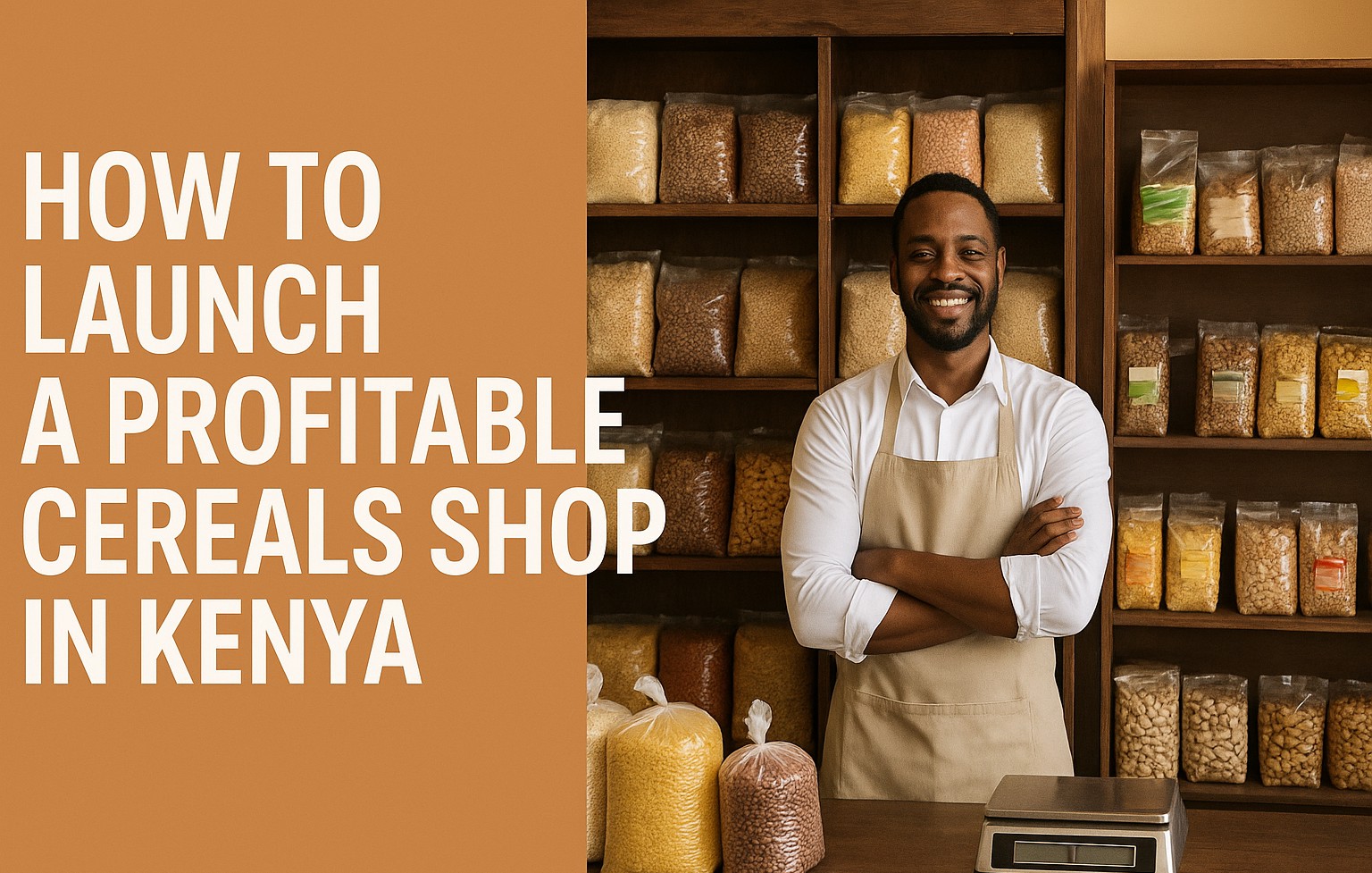

Titus Morebu
Author
How to Launch a Profitable Cereals Shop in Kenya: A Modern Guide
Learn how to legally start, stock, and grow a cereals shop in Kenya—complete with permits, supply strategies, marketing tips, and profit projections.
Thinking of opening a cereals shop in Kenya? Whether you want a small-scale neighborhood shop or scale into a regional brand, this guide walks you through each step—legally, financially, operationally, and strategically—to help you build a sustainable, profitable venture. 🍚
Why a Cereals Shop Is a Smart Bet in Kenya
- High staple demand: Cereals, pulses, grains are daily essentials for households.
- Low perishability: Most cereals have long shelf life, reducing spoilage risks.
- Scalable business model: You can start small and grow gradually.
- Scope for value-addition: Packaging, blending, branding create premium margins.
Step 1: Research & Plan Your Business
Define Your Concept & Niche
Decide your core offerings—beans, maize, rice, lentils, special grains (quinoa, millet), custom blends, organic lines, fortified cereals, etc. A niche helps you stand out.
Market Survey
- Visit local markets, retail shops, supermarkets to note pricing, packaging, brands.
- Analyze consumer preferences: bulk vs small packs, organic vs conventional, blended powders vs raw grains.
- Understand your catchment area population, household sizes, purchasing power, and competition.
Financial Projections & Break-even
Estimate startup cost, monthly fixed & variable expenses, and sales needed to break even. Many entrepreneurs in Nairobi start with ~ KES 40,000—100,000 as basic capital. (Costs depend on location and stock scale.)
Step 2: Legal Setup & Compliance
Register Your Business
Go to the eCitizen portal to register a sole proprietorship, partnership, or limited company. Acquire your business PIN via Kenya Revenue Authority (KRA).
Obtain a Unified Business Permit (Single Business Permit)
This is issued by your county government and integrates trading license, health, signage, and fire licenses. You apply through your county revenue office. The permit is annual and must be renewed. Many counties now support online application. (For example, Nairobi, Kisumu, Mombasa have e-services portals.)
Public Health / Food Safety / Hygiene Permits
Your premises must be inspected by the Public Health Department to confirm hygienic standards. Food handlers in your shop should have health certificates. You’ll also get a Food Hygiene License.
Fire Safety Certificate
The local fire department inspects and issues a Fire Compliance Certificate after verifying fire-fighting equipment, exits, etc.
Product Registration & Standards Compliance
If you package cereals, you must register your products with Kenya Bureau of Standards (KEBS), comply with food labeling, weight standards, and quality assurance. Your manufacturer must meet QMS or food safety standards. Also, you must obey the Food Crops Regulations—operating a food business or processing plant requires valid licenses.
Other Licenses & VAT Registration
Obtain signage/licensing for advertisements if you put up signboards. If your annual turnover exceeds KES 5 million (or as per current threshold), register for VAT with KRA.
Step 3: Choosing Location & Setting Up Shop
Location & Size
Choose a location with moderate-to-high foot traffic (residential areas, near markets, bus stops). The shop size depends on stock scale—might range 20 m² to 100 m² or more.
Layout, Storage & Infrastructure
- Install sturdy shelves, pallets, bins, and airtight containers to prevent pests.
- Ensure good ventilation, proper flooring, and pest control system.
- Provision for weighing scales (manual and digital), packaging area, and cashier counter.
- Reliable power, water, waste management.
Branding & Signage
Create a clear, attractive shop sign. Use consistent branding, color themes, and visibility. Display permit certificates (health, business permit) inside the shop to build trust.
Step 4: Sourcing & Supply Chain
Direct from Farmers & Cooperatives
Where possible, buy cereals in bulk from farmers or cooperatives to minimize layers of markup.
Wholesalers / Markets & NCPB Registration
Register as a supplier or agent with the National Cereals & Produce Board (NCPB) so you can access cereals at official depots. This helps reduce middleman costs. Bulk wholesale markets (e.g. Wakulima Market in Nairobi) are useful sources.
Packaging & Labeling Suppliers
Choose cost-effective packaging materials (bags, sacks, labels) that preserve quality, are food-grade, and adhere to labeling regulations.
Inventory & Quality Control
- Train staff to inspect quality (moisture, pests, smell).
- Use FIFO (First In, First Out) stock rotation.
- Maintain stock cards or digital inventory system to track in/out.
Step 5: Staffing & Operations
Recruit & Train Staff
Hire shop assistants and cashiers. Train them in customer service, hygiene, handling cereals, measuring, and upselling.
Daily Operations & Systems
- Use a POS system or register book to track sales by product (enable analytics).
- Set opening/closing routines (sweeping, checking stock, cleaning, reconciling cash).
- Implement security systems (locks, CCTV, safe storage) since cereals can be targets for theft.
Step 6: Marketing & Customer Acquisition
Brand Differentiation & Unique Selling Propositions (USP)
Offer something special—custom blends, organic lines, home delivery, promotion bundles, loyalty programs, clean environment, or small-quantity packaging.
Online & Offline Channels
- Set up a basic social media presence (Facebook, Instagram, WhatsApp Business).
- List your shop on Google Maps / Google Business Profile to attract nearby searchers.
- Offer delivery within your area (partner with local boda-poda or courier). Online performance helps with visibility. (Kenya’s e-commerce environment is evolving.)
- Distribute flyers, posters, and sample offers in the neighborhood.
Promotions & Bundling
Do package deals (e.g. beans + maize), loyalty discounts, referral discounts, bulk purchase discounts. Encourage repeat customers.
Step 7: Financial Management & Scaling
Cost Control
Carefully monitor rent, utilities, transport, staff wages. Negotiate with suppliers for discounts. Reduce wastage and pilferage.
Pricing & Margins
Typical markup on cereals can be 10-25 % depending on competition. Blend margin with volume. Use cost-plus pricing with periodic market checks.
Break-even & Profit Projection
Expect to break even within 6–12 months, depending on scale. Some shopkeepers investing ~ KES 300,000 claim potential profits of ~ KES 40,000/month under favorable conditions.
Reinvestment & Expansion
Reinvest initial profits into expanding inventory, adding branches, offering packaged private label products or distributing to smaller sellers.
Common Challenges & How to Overcome Them
- Supply inconsistency & price volatility: Mitigate by long-term supplier contracts, bulk purchasing, buffer stocks.
- Pests, moisture, contamination: Use airtight packaging, fumigation, regular inspection.
- Competition from larger supermarkets: Focus on convenience, personalized service, smaller packs, delivery, niche lines.
- Regulatory inspections: Maintain hygiene, keep permits visible, staff trained in compliance.
- Cashflow shortages: Use staggered supplier payments, maintain a reserve, start with conservative scale.
Case Study Snapshot
Suppose you invest KES 300,000 in shop setup: rent, shelves, initial stock, permits, packaging. If daily sales average KES 5,000 (≈ KES 150,000/month), cost of goods ~ 60 %, other expenses ~ KES 20,000, you might net ~ KES 40,000 monthly profit. This scale is often viable in medium traffic areas.
Checklist Summary Before Launch
- Business registration & KRA PIN
- Unified business permit, health & fire certificates
- Choose shop location & layout
- Sourcing contracts & supplier agreements
- Inventory systems & POS setup
- Staff recruitment & training
- Marketing plan & promotional offers
- Cashflow & break-even forecast
- Soft launch, gather feedback, iterate
Conclusion & Next Steps 🌱
Starting a cereals shop in Kenya is a viable venture when you combine sound planning, regulatory compliance, smart sourcing, and consistent customer service. Begin modestly, validate your market, then scale steadily. Stay agile, track metrics, and adapt to consumer preferences. With discipline, your cereals shop can become a trusted local brand and profitable business.
Learn more from Kenya’s food processing regulations and trade environment via government portals and standardization bodies. Also explore resources like InfoTrade Kenya and Kenya Bureau of Standards for licensing and product compliance.
Gallery

Related Articles
3 articles
How TitoCreations Empowers Kenyan Entrepreneurs With Smart Business Systems
Discover how TitoCreations equips Kenyan entrepreneurs with profitable business ideas and modern software systems to start, manage, and scale successful ventures.

How to Start Poultry Farming in Kenya 2026: A Complete Step-by-Step Guide to Profit
Learn how to start and run a profitable poultry farm in Kenya in 2026 with up-to-date setup, costs, management, marketing, and profit strategies.

Freelancing in Kenya: How to Start With No Experience 2026
Learn how to start freelancing in Kenya with zero experience, build marketable skills, find clients, and earn KES or dollars online in 2026.